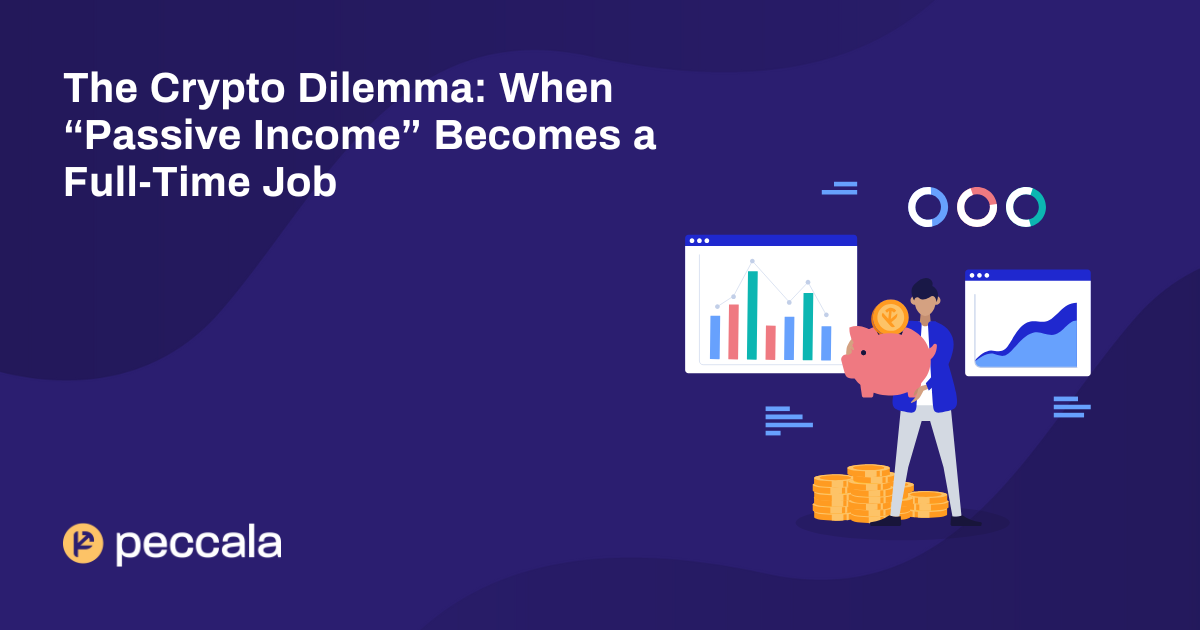The dream of earning passive income while you sleep, travel, or pursue your passions is a major draw of investing, especially in crypto. This is the financial freedom that everyone is chasing.
In reality, many investors find themselves with a second, unpaid job. They’re glued to their phones, losing sleep over market swings, and genuinely feeling more anxious than liberated by their investments.
If this sounds familiar, you’re not alone. In this article, we break down exactly why this noble pursuit of passive income in crypto so often becomes a time-consuming endeavour for many.
The Three Habits of the Accidental Full-Time Crypto Trader
It starts so innocently. You start investing in cryptocurrency, thinking that it’d make you a few quick dollars here and there. Soon, you begin noticing that investing takes up more and more of your time.
Here are a couple of habits that we’ve noticed from accidental full-time crypto traders:
24/7 Chart Watching
It often starts with a quick glance at your portfolio over morning coffee. Before long, you’re checking charts at 3 a.m. The result? Severe decision fatigue, anxiety, and sleep loss, as it slowly saps your mental energy throughout the day.
Endless Researching
You want the exclusive alpha. You’ve joined 5 different Discord groups because they promised the next “100x gem”. You have 37 tabs open, all about the markets.
While this diligence is admirable, this hunt often leads to analysis paralysis and a constant, nagging fear of missing out.
Emotional Involvement
This is where it all leads: emotional investing. The emotional, rational, and occasionally illogical investor will act for one of two reasons: FOMO (The Fear of Missing Out) and FUD (Fear, Uncertainty, and Doubt).
Becoming too emotionally involved is the end result of chart watching and endless research.
First comes FOMO, when you see a coin skyrocketing and everyone in your discord celebrating, there’s a chance you’ll feel left behind and buy in near the top.
Then comes FUD, when markets crash, doubts creep in, and you panic sell at a loss
This classic cycle causes many to buy high and sell low.
These habits aren’t your fault. They’re fueled by powerful psychological biases that are tough to overcome.
For example, neuroscientists have shown that in our brains, the pain of losing is psychologically twice as powerful as the pleasure of gaining. Losing $100 from your wallet feels worse than finding $100 on the street. This intense fear of loss is why panic selling is a common phenomenon.
Constantly checking your portfolio is another psychological trap that we have to avoid. It’s like pulling the lever on a slot machine... Most of the time, nothing exciting happens. But occasionally, the markets “reward” you with a flash of green. This system of unpredictability triggers a dopamine release in your brain that makes you want to keep coming back for more.
It’s psychological biases like these that have profound effects on trading outcomes without you knowing about it, so it’s important to be aware and handle them ASAP.
The Hidden Costs of Crypto: It’s More Than Just Market Losses
These habits aren’t just detrimental to your portfolio performance, but they also have negative impacts that bleed into every area of your life.
The connection between financial worries and mental health is clear. According to a 2023 Sleep Foundation survey, a staggering 77% of adults lose sleep over financial stress. For younger investors, it's even more acute, with over half of millennials reporting regular sleep disturbances due to financial anxiety. This isn't just a feeling; it's a chronic health issue that disrupts your sleep, spikes anxiety, and can strain your relationships with loved ones.
More than that, while the average investor spends around six minutes researching an asset before buying, a study by GraniteShares found that nearly one in eight serious investors spends at least an hour per day managing their portfolio. That's over 365 hours a year—the equivalent of nine full-time work weeks dedicated to a "passive" strategy. What is that time truly worth to you?
Imagine all the things that you could’ve done with that time, whether it's building your career, learning a new skill, or simply being present with loved ones. It’s the mental peace you could have had while hiking in the mountains or being present with friends and family. The real loss isn’t the dip in your portfolio, it’s in your time and peace of mind, it’s the real-world experiences you’re missing because you’re too busy monitoring it.
It’s Not You, It’s The Approach
If you recognize yourself in this article, know that the manual approach to crypto investing has failed you.
Your investments should reduce stress and give you back your time, not have you fawning over them 24/7, 365 days a year.
That’s where automated trading comes in. We’ve explained how it works and why it’s the key to a winning strategy in the digital age.


